
27 minute read
AROUND CAMPUS A review of news and events at Midwestern Seminary
Spring Academic Convocation at Midwestern Seminary addresses sufficiency of Scripture
By T. PATRICK HUDSON
In delivering the second installment of his “Truths Worth Contending For” series, President Jason Allen opened Midwestern Seminary’s spring semester with an Academic Convocation message addressing the sufficiency of Scripture. The service took place in the Daniel Lee Chapel on Jan. 21.
Additionally, newly-elected seminary faculty member, Jason DeRouchie, signed the institution’s Articles of Faith during the service. Allen’s first message of the 10- part “Truths Worth Contending For” series took place during the school’s December graduation service on Dec. 6, 2019, and focused on the inerrancy of God’s Word.
Now, in the series’ second message, Allen argued that believers should contend for the sufficiency of Scripture. Through an exposition of 2 Timothy 3:15-17, he fleshed out why sufficiency matters and outlined 10 application points about how Scripture is sufficient for believers.
Allen explained that if denying biblical inerrancy takes something out of students that nothing else can replace, then to deny sufficiency fails to put something in them. Denying inerrancy removes one’s confidence in the Bible, he added. Underemphasizing sufficiency fails to provide a fuller, more robust, more perennial confidence in the Bible.
One way that Satan can damage the church, Allen continued, is not necessarily by attacking the inerrancy of Scripture, rather it would be through the undermining of the sufficiency of Scripture.
Allen defined “sufficiency” from 2 Timothy 3:17 saying “that the Word of God, the inspired, inerrant Word of God is given to us, and with it the man of God, the woman of God, is adequate, equipped for every good work.” The reason it matters to believers, Allen concluded, is that the Scriptures convey all truths necessary for Christian living and Christian ministry. Because it is inerrant—God’s Word is profitable to us for teaching Christian doctrine, the truth of Scripture, how to live the Christian life, and what Christians are to “For us in this ministry moment and for every generation of Christian ministers, is it not good and fitting and right to, again and again, reassert and reprioritize the sufficiency of Scripture?” - Jason Allen
believe. This is all wrapped up with a promise in verse 17, that believers are “equipped to do every good work” as a result of Scripture’s sufficiency.
“You see, brothers and sisters, an errant Bible is an insufficient one,” Allen said. “A Bible that is not without error is a Bible that is not sufficient for Christian ministry.” In this passage, Paul is telling Timothy that regardless of the difficult circumstances he’s facing, Scripture is enough. Allen said the same is true for modern-day believers.
and for every generation of Christian ministers, is it not good and fitting and right to, again and again, reassert and re-prioritize the sufficiency of Scripture? Our churches may need much, but what they need most of all is the preaching and teaching of God’s Word. Our children may need much, but what they need most of all is the teaching of God’s Word. Our communities may need much, but what they need most of all is the preaching of God’s Word.” Prior to Allen’s message, DeRouchie signed the institution’s Articles of Faith, which consists of the Baptist Faith & Message 2000, the Chicago Statement on Biblical Inerrancy, the Danvers Statement on Biblical Manhood and Womanhood, and the Nashville Statement on biblical sexuality. DeRouchie, who serves as research professor of Old Testament and biblical theology, was elected by the Board of Trustees in October 2019. As such, by signing the book, he promised to uphold Midwestern Seminary’s Articles of Faith.
To view Allen’s message in full, visit mbts.edu/sp20convocation. •
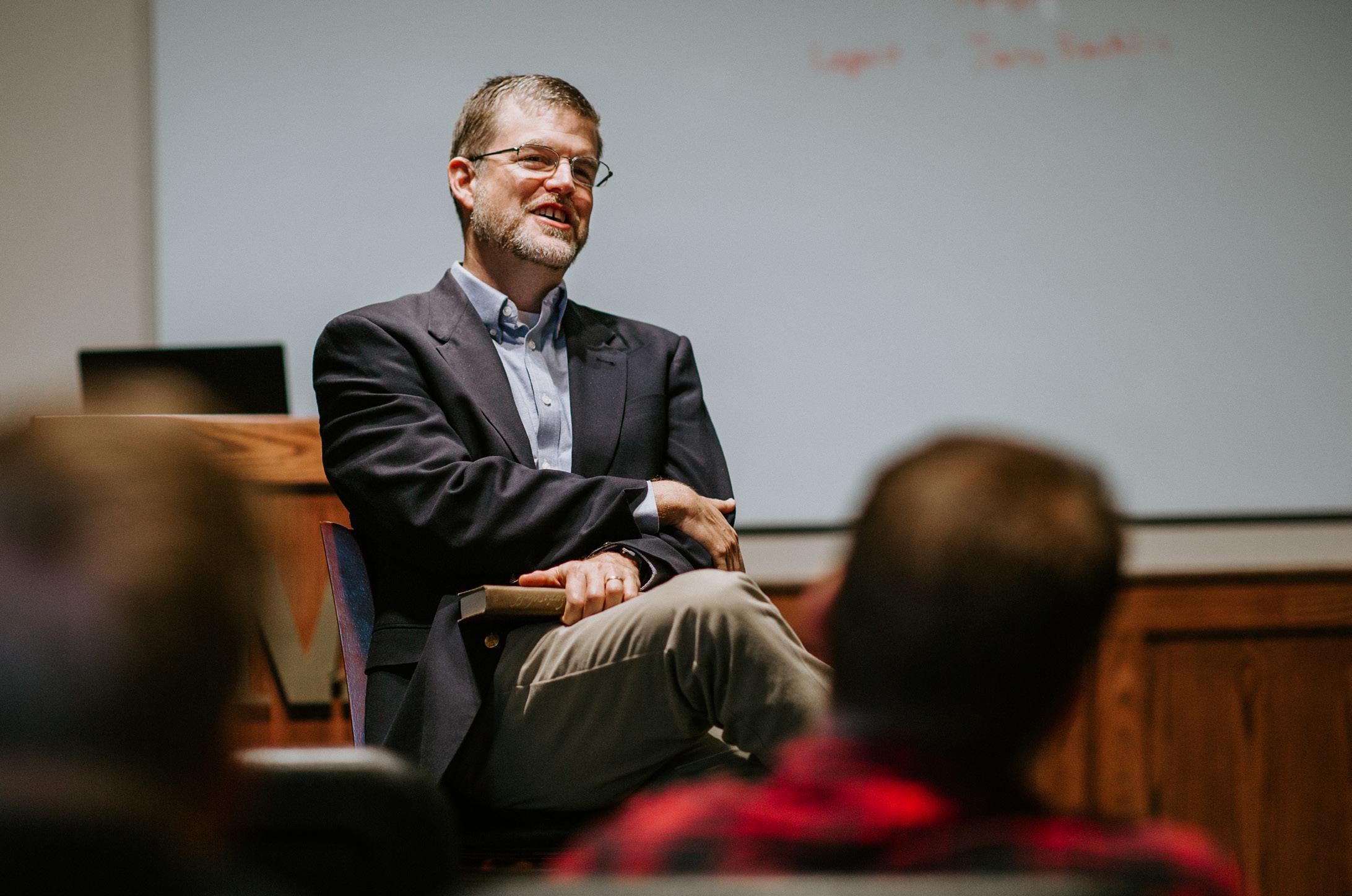
Historian Thomas S. Kidd joins Midwestern Seminary faculty as distinguished visiting professor
By T. PATRICK HUDSON
Midwestern Baptist Theological Seminary President Jason Allen has announced that historian Thomas S. Kidd will join the MBTS faculty as distinguished visiting professor of church history.
Kidd will continue his role as distinguished professor of history at Baylor University. As such, he will serve the Midwestern Seminary community by commuting from Waco, Texas, to Kansas City, Mo., for doctoral seminars and to instruct graduate and doctoral students in the discipline of history both in classroom and in conference settings.
“I could not be more delighted to announce Dr. Tommy Kidd’s joining our faculty as a distinguished professor of church history,” Allen said. “We, at Midwestern Seminary, have a longstanding relationship with Dr. Kidd, and we look forward to deepening that relationship in the years ahead. I’m thankful for the partnership with Baylor University that though Dr. Kidd will remain in residence there, he’ll be on our campus multiple times a year, leading doctoral seminars, teaching Master of Divinity intensives, and supervising doctoral students. Students can come to Midwestern Seminary and anticipate to study with Dr. Tommy Kidd.
“Dr. Kidd is extensively published and widely respected throughout the Baptist and evangelical world—and beyond. Dr. Kidd stands out as one of our generation’s leading church historians. What is more, he deeply resonates with Midwestern Seminary’s mission of existing for the church.
Adding Dr. Kidd to the ranks of our other church historians and historical theologians is a tremendous step forward in those disciplines, putting us as a theological institution in an enviable position. It’s also a significant step forward in our goal of assembling at Midwestern Seminary the premier faculty in the evangelical world.”
Allen added that Kidd’s joining the faculty here reflects “God’s blessing on Midwestern Seminary wherein in recent years He has been pleased to send us a new generation of accomplished scholars, dedicated churchmen and devoted Southern Baptists who are committed to Midwestern Seminary’s vision of existing for the Church.”
Kidd noted excitement about his new responsibilities, saying, “I am thrilled to join Midwestern Seminary in its work to glorify the Lord and serve the church by training up a new generation of pastors and Christian scholars. Midwestern is one of the most exciting seminaries on the American church landscape today, and I am delighted and honored to contribute to the dynamic faculty that Midwestern is assembling.
“Additionally, I hope to bring students a strong sense for what the Lord has done in and through the church and for them to learn from the great ‘cloud of witnesses’ that we encounter in church history. Too often, American Christians act as if not much has happened in between the time of Christ and this Sunday’s church service. Our failure to search out the lessons of church history deprives us of a trove of wisdom for ministry.”
Kidd added that his hope for students taking his courses would be for them to realize Christians need not set aside their faith while they do serious, scholarly historical inquiry. Instead, they can serve the Kingdom with a deeper historical understanding of how the church came to be what it is today.
Kidd began his teaching career at Baylor in 2002 after completing a Ph.D. in history at the University of Notre Dame, where he worked with historian of religion George Marsden. He also earned Bachelor of Arts and Master of Arts degrees at Clemson University in South Carolina.
“To have someone of the caliber of Thomas Kidd, both in heart and mind, join our faculty is a true blessing to the Midwestern Seminary community and especially our students,” said Provost Jason Duesing. “I can think of no one else currently writing and researching in American history that would be a better complement to our academic programs and our
vision of pursuing scholarship for the church than Dr. Kidd.”
In addition to his professorship in history, Kidd is the associate director of the Institute for Studies of Religion at Baylor, and he has authored numerous books including American History, vols. 1 and 2 (B&H Academic, 2019), Benjamin Franklin: The Religious Life of a Founding Father (Yale University Press, 2017), American Colonial History: Clashing Cultures and Faiths (Yale University Press, 2016), Baptists in America: A History (with Barry Hankins, Oxford University Press, 2015), George Whitefield: America’s Spiritual Founding Father (Yale University Press, 2014), Patrick Henry: First Among Patriots (Basic Books, 2011), God of Liberty: A Religious History of the American Revolution (Basic Books, 2010), American Christians and Islam (Princeton University Press, 2008), and The Great Awakening: The Roots of Evangelical Christianity in Colonial America (Yale University Press, 2007).
Kidd has written for media outlets including the Washington Post and the Wall Street Journal, and he also blogs at “Evangelical History” at The Gospel Coalition website. In the classroom, Kidd teaches courses on colonial America, the American Revolution, and American religious history.
He and his wife, Ruby, have two sons, Jonathan and Joshua. The Kidds attend Highland Baptist Church in Waco, Texas, where Tommy teaches Sunday school.
To learn more about academics at Midwestern Seminary, visit mbts.edu/academics. •
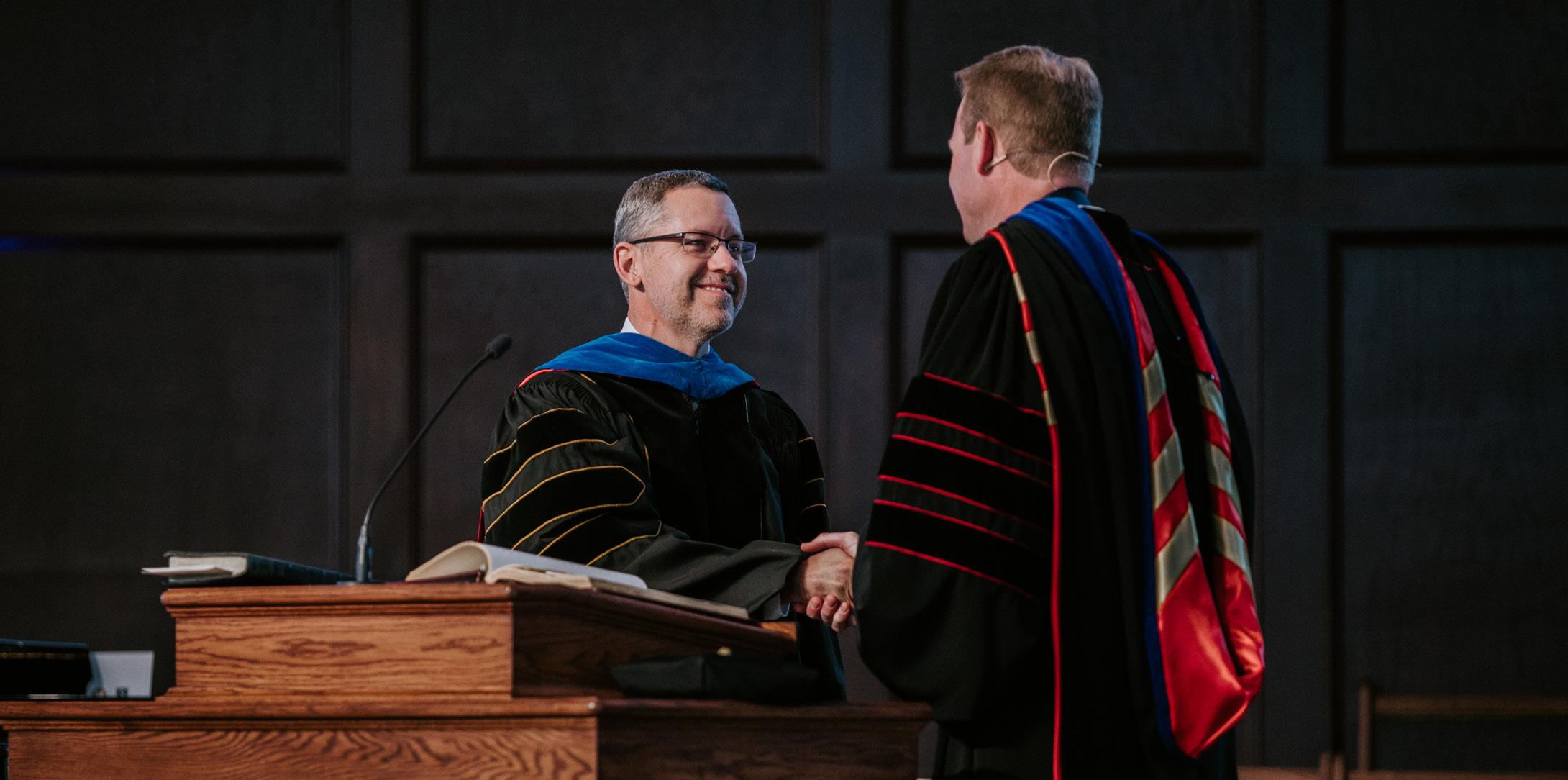
DeRouchie elected to Faculty
by T. PATRICK HUDSON
Based upon a recommendation from the Academic Committee, Jason DeRouchie was elected by the Trustees to Midwestern Seminary’s faculty as research professor of Old Testament and biblical theology. “I cannot be more pleased to announce the election of Dr. Jason DeRouchie to the faculty of Midwestern Seminary,” President Jason Allen said. “As an established author and teacher, Dr. DeRouchie is widely respected as an accomplished Old Testament scholar; yet he’s young enough to be numbered among a rising generation of scholars here in Kansas City. By God’s grace, we hope Dr. DeRouchie will be used to serve the church and reach the nations for decades to come.”
Of being elected as Midwestern Seminary’s newest faculty member, DeRouchie said, “My heart beats ‘for the Church’ of Jesus, both near and far, and I’m thrilled to have joined Midwestern Seminary’s strong, God-dependent faculty in helping to mobilize biblically faithful, Christ-exalting, globally-minded Christian leaders who will seek the obedience of faith for the sake of Christ’s name among the nations.” DeRouchie came to Midwestern Seminary in the summer of 2019 after serving at Bethlehem College & Seminary in Minneapolis as professor of Old Testament and Biblical Theology since 2009. Before his tenure at Bethlehem, he was an instructor of biblical Greek and Hebrew at Gordon College and Gordon-Conwell Theological Seminary in Massachusetts, an associate pastor in a Southern Baptist church in Indiana, and assistant professor of Old Testament and Hebrew at Northwestern College in Saint Paul, Minn.
A well-recognized author, |DeRouchie has published a number of books, including How to Understand and Apply the Old Testament: Twelve Steps from Exegesis to Theology; For Our Good Always: Studies on the Message and Influence of Deuteronomy; What the Old Testament Authors Really Cared About: A Survey of Jesus’ Bible; A Modern Grammar for Biblical Hebrew; A Modern Grammar for Biblical Hebrew: Workbook; and A Call to Covenant Love: Text Grammar and Literary Structure in Deuteronomy 5–11. He also has several forthcoming books.
DeRouchie is a graduate of Taylor University with a Bachelor of Arts in biblical studies. He earned a M.Div. from Gordon-Conwell Theological Seminary, and a Ph.D. in Old Testament Literature from Southern Seminary in Louisville, Ky.
He has been married to Teresa since 1994, and they have six children, three of whom have been adopted from Ethiopia. •
Library Renovation
by T. PATRICK HUDSON
The lone remaining space in the heart of Midwestern Seminary’s campus to be renovated— since his arrival in 2012—is the campus library, said President Jason Allen. As such, beginning in November 2019, the facility began undergoing a significant overhaul. Allen noted that in the digital age, and with access to books from other libraries, only about 15-percent of the Midwestern Seminary library’s hard-copy books are used regularly. As such, the square footage of the library will be reallocated for other use. “We’ll have the books that are frequently used by students available within reach. The rest will be stored in another off-campus facility which can be accessed quickly and conveniently,” Allen explained.
This opens space for library staff offices, faculty offices, conference rooms, and significantly more study space for students. Additionally, the building’s second floor will host more faculty office space and doctoral study carrels. Lastly, the third floor will subsequently be used to house Midwestern Seminary’s archives, which are currently housed in multiple places around campus.
“We want this remodeling project in our library to be one that is student-friendly,” Allen said. “Our goal is to make this space one that students are proud to use, functional for their research and study needs, and a hub for individuals and groups alike to accomplish all of their academic goals in preparing for ministry.”


The estimated $3 million project is slated to be completed by the start of the 2020/21 academic year. It is being paid for through the seminary’s capital budget. •
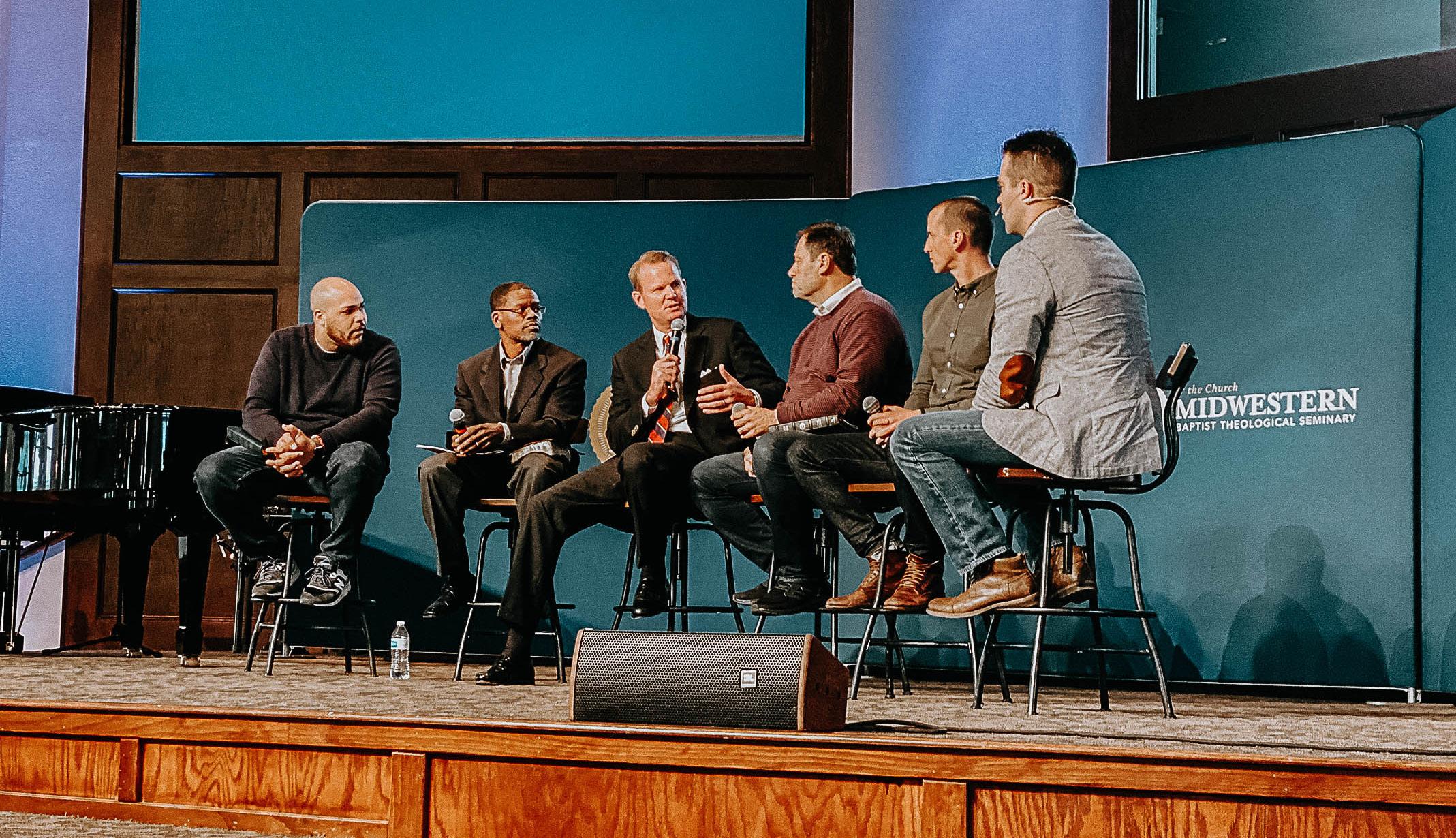
Midwestern Seminary hosts 9Marks Conference on The Gospel
By T. PATRICK HUDSON
Midwestern Seminary partnered with 9Marks to host “A Conference on The Gospel” on Feb. 4 in Kansas City, Mo., with sessions aimed at providing a biblical understanding of the gospel.
Keynote speakers Mark Dever, Zach Schlegel, Brian Davis, Bobby Scott, and Jeremy Treat brought lectures and messages revolving around how the gospel is essential for salvation, for reconciliation with God, and for the local church.
“We are grateful to partner with 9Marks to encourage pastors and ministry leaders from around the nation,” said President Jason Allen. “Through such events, we also desire these pastors and ministry leaders to know that they can trust Midwestern Seminary to provide unparalleled theological education for not only themselves but for those called into the ministry from their churches.”
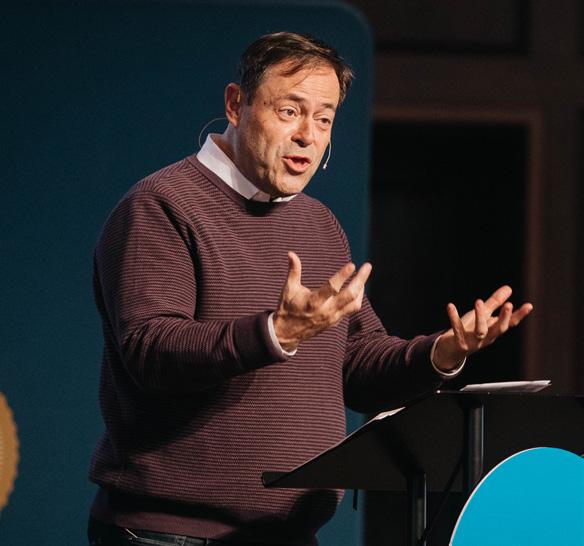
Mark Dever
Dever, the senior pastor of Capitol Hill Baptist Church in Washington, D.C., led the conference’s first session asking three basic questions: What’s the gospel? What’s the church? and What are things we can do to keep the gospel central in our local church? To begin, Dever warned the audience to “Never assume that everyone knows and understands what the good news is.” He then defined the gospel, saying, “The good news is that God, through Christ, is reconciling sinners to himself so that all who have repented of their sins and trust in Christ alone for their salvation are forgiven for their sins. The punishments have fallen on Christ, our substitute, who was crucified, died, buried, was raised, ascended, and is returning.
“I took about 40 seconds say that to you,” he continued. “So, there is no reason
that you can’t, in your own fellowship of Christians, often
remind each other of what the good news is. Make sure the good news is clear. There are many ways it can be said, but the news itself is wonderful.” Dever also noted that the local church holds special responsibility for shaping and preserving the gospel. Once a church is established, then that body should be a “pillar and foundation of gospel truth.”
He concluded by offering 16 practical points of application for how pastors can be good stewards of the trust God has given the local church in preserving the gospel.
Zach Schlegel
Schlegel, senior pastor of First Baptist Church of Upper Marlboro, Md., brought a message about how words are vitally important for anyone who is communicating, but they’re even more essential for pastors. The reason pastors should feel the weightiness of their word selection is because carelessly preached words could wreck lives, or they could wreck churches.
Preaching from 2 Timothy 2:14- 26, Schlegel highlighted how the
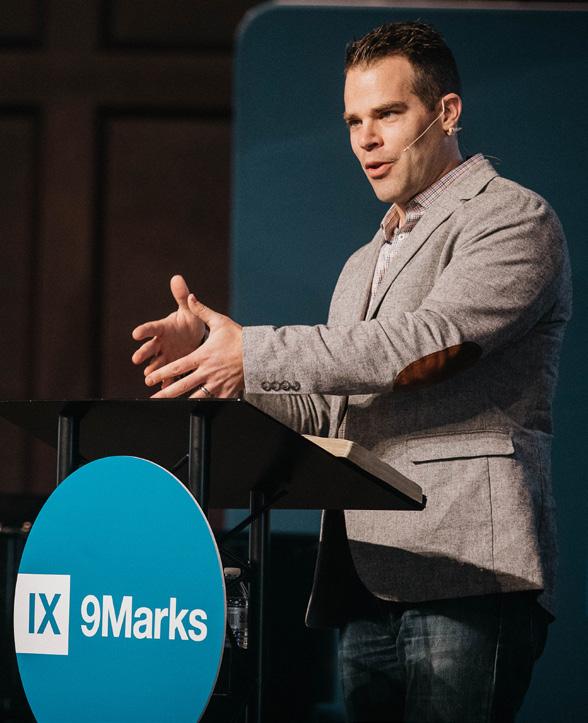
apostle Paul taught Timothy to deal with false teachers in the church. As such, an example is provided for how today’s pastors can protect their churches and protect the gospel as well. He did this by using three metaphors: the good worker, the clean vessel, and the Lord’s servant.
A “good worker,” a.k.a. the pastor, is to remind the church body of the gospel, lead them away from quarreling, handle God’s word rightly, and strive to be approved by God.
The pastor as a “clean vessel” is to distance himself from false teachers and false teaching.
“Pastor, settle in your mind right now about the sufficiency of God’s word for our task,” Schlegel said. “Hold fast to God’s word. Preach God’s word. Stay away from the ear-tickling ideas of man that twist and ignore the words of God so you will be a vessel for honorable use.” Finally, Schlegel encouraged attendees to be the “Lord’s servant”— accomplishing this task by being kind, even amidst a heated confrontation, as it may lead to the other person’s repentance and salvation.
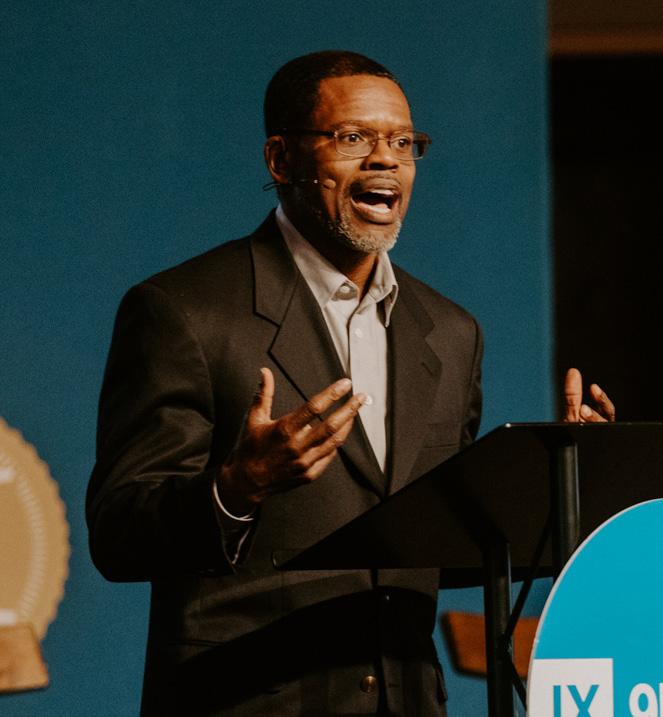
Bobby Scott
The conference’s next message was delivered by Scott, pastor of Community of Faith Baptist Church in South Gate, Calif., who was tasked with encouraging attendees to be faithful witnesses for Christ and with showing them how they can train others to present the gospel message as clearly as possible.
Over the centuries, Scott explained, God has used ordinary people to proclaim his gospel message. Scott then walked the audience through specific examples of the Bible’s redemption story, particularly seeing Jesus in the Old Testament, and he keyed on the fact that today’s believers need to read the story, trust in the story, and refer to the story in order to tell others the story. In concluding, Scott advised, “Go back and tell your people the gospel is a story, and they can tell the story. It is a story about our King, who came to rescue us by dying in our place, conquering sin, death, Satan, and everything else. And he arose victorious to grant salvation to any and all who repent and believe. That’s the story.

Jeremy Treat
Treat, pastor for preaching & vision at Reality Church of Los Angeles, brought the next message, sharing where the theme of the kingdom of God comes from, why it matters, and how it relates to the gospel.
Treat defined the kingdom of God as “God’s reign through God’s people over God’s place.” He added that there is significance in adding “of God,” because “if you talk about the kingdom as some kind of utopian paradise, but you don’t mention God, then you’ve completely missed it. No, the kingdom is a vision of the world reordered around God’s sovereign love. So, it’s about the reign of God, but God reigns through his people. And so, God reigns through his people over a place, the kingdom of God.”
Showing how the kingdom of God ties in with the gospel, Treat said the kingdom shows us that the gospel applies to all of life. Additionally, we should make our faith public, as that’s how the gospel is spread.
Treat also noted that the kingdom shows the gospel is communal. Once we are saved individually, we are also saved into a body—the church. He said, “The church fits within the broader vision of the kingdom of God. The church is the redeemed people of God gathered by the gospel and organized according to the Scriptures. The church is the instrument of the kingdom of God, so the world ought to be able to look in at the church and say, ‘Oh, that’s what it looks like living under the gracious reign of God.’”
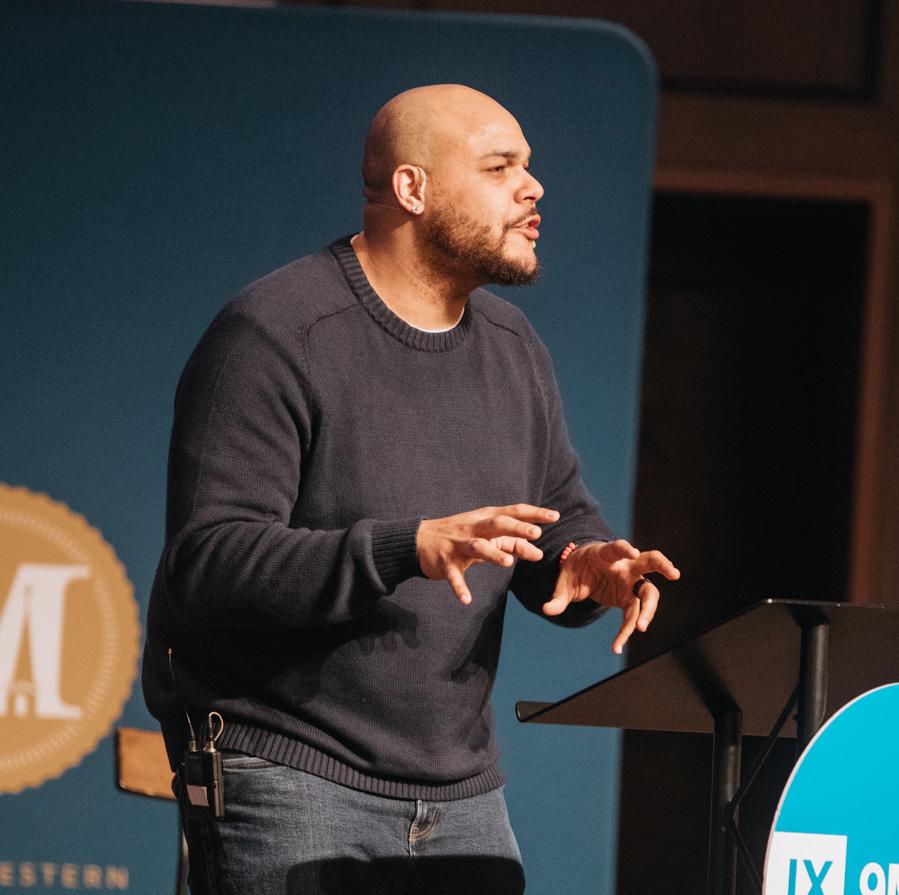
Brian Davis
In the conference’s final session, Davis, who is pastor of Risen Christ Fellowship in Philadelphia, preached from 1 Corinthians 15:9-10 and provided insight into the topic, the posture of gospel ministers. The top priority in a pastor’s life is the proclamation of the Gospel of Jesus Christ. With this priority in mind, the appropriate posture, Davis explained, is to minimize oneself and to magnify the Lord.
Speaking to a pastor’s humility, Davis referred to the apostle Paul, who minimized himself in light of the real priority.
“Paul elaborated on this glorious gospel of Christ. He was compelled to humiliate himself by showing his own dishonor and weakness and unworthiness even to be a bearer of the message. So, he aimed at rightly prioritizing the message to rightly posture himself as a minister. The minister must know and show that he himself is empty. They must minimize themselves.”
Secondly, Davis shared that it is only by God’s grace that a pastor can minister the gospel. He explained from 2 Corinthians 4:7 that a pastor is like a clay vessel, which in ancient times was cheap and fragile, but it still showed light.
“Boy does that describe us. So, Paul is communicating that he’s of very little value, and he’s very fragile and weak. It would be the equivalent to us comparing ourselves to a paper product or to Styrofoam cups. “The whole reason God chose you as an earthly pot is to show where all the power is, and it’s not in you. We have this treasure in jars of clay to show that the surpassing power belongs to God.” To view all sessions of the “A Conference on The Gospel,” visit mbts.edu/9marks20.•
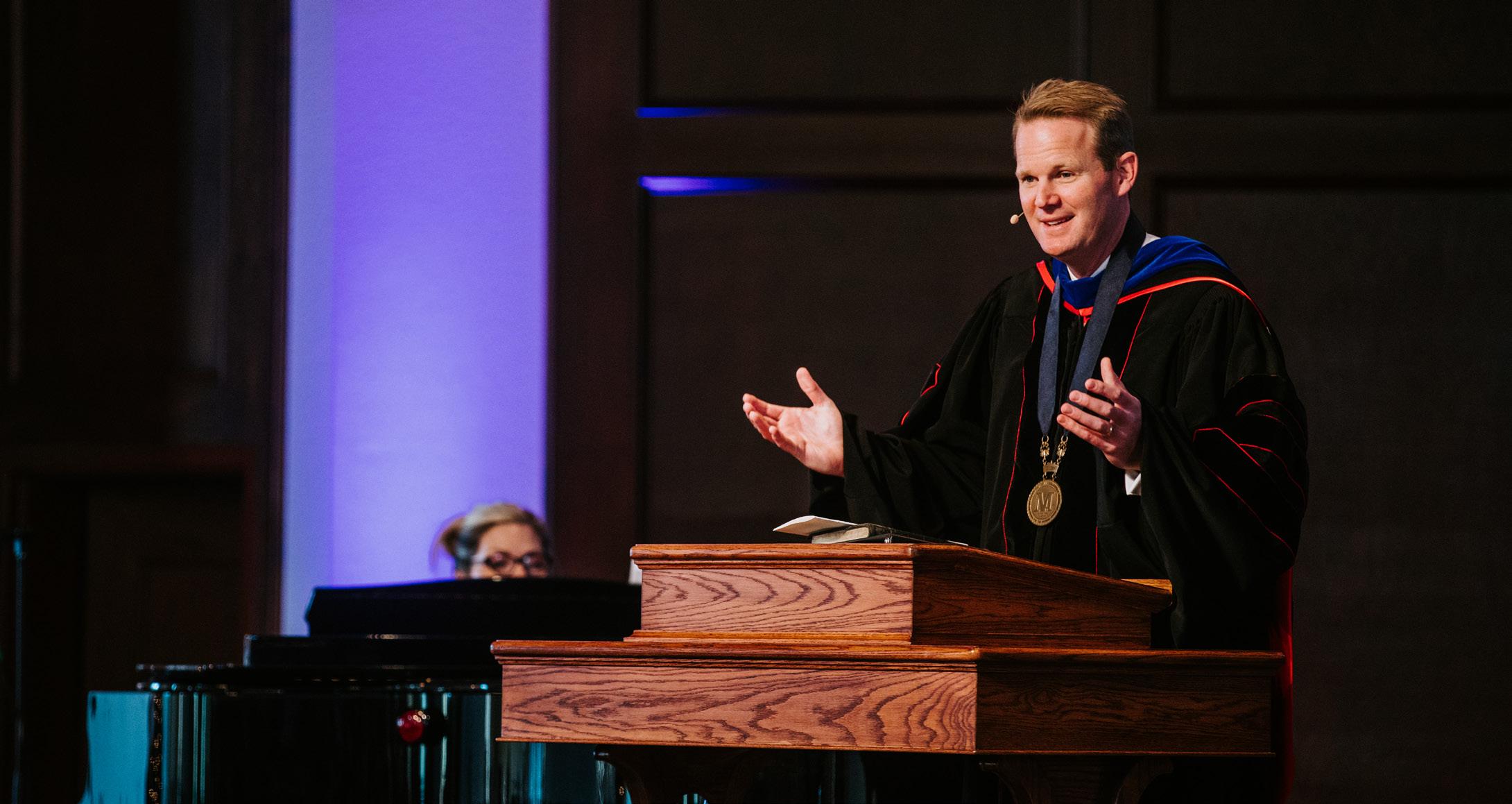
MBTS celebrates graduates; president launches “Truths Worth Contending For” series
By T. PATRICK HUDSON
In the same spirit and celebratory atmosphere of the Christmas season, the Midwestern Seminary community celebrated the culmination of its students’ hard work, dedication, and perseverance, as the school held its 66th commencement exercises on Dec. 6.
Additionally, President Jason Allen announced that the seminary will begin a series of messages—during graduation and convocation service addresses over the next couple of years—focusing on specific doctrinal topics of urgency and relevance.
Two hundred and five students were conferred 222 degrees and began their ministry service as the next generation of pastors, missionaries and ministry leaders. With the enrollment increases the school has made, now surpassing 4,000 students, the number of graduates has also increased, up from the 169 students who graduated this time last year.
Midwestern Seminary also celebrated a noteworthy milestone during the commencement ceremony, as 29 Spanish-speaking church planters earned their Church Planting Certificates. Two of those graduates also received their Master’s in Theological Studies with an emphasis on Pastoral Ministry.
Felix Cabrera, assistant professor of pastoral ministry and Spanish church relations coordinator, helped pioneer the certificate program in 2017. “What happened today is epic and historic. The pilot program is no longer a pilot,” Cabrera shared. “Ministerial experience combined with theological education is an ideal scenario for these pastors who serve in the Dominican Republic, Venezuela, Mexico, Paraguay, Nicaragua, and Puerto Rico.”
Kicking off the 10-part graduation/convocation sermon series focusing on significant, urgent doctrinal issues—including topics such as the sufficiency of Scripture, the exclusivity of the gospel, and penal substitutionary atonement—
Allen noted there’s no better place to begin than with biblical inerrancy. As such, he preached a message from Jude entitled, “Truths Worth Contending For: Biblical Inerrancy.” Allen acknowledged that commencement is an ideal setting to focus on the topic of inerrancy because it’s the “biggest, grandest stage that we have to offer, and our topic today, biblical inerrancy, merits such a stage.”
He added that, as Southern Baptists, there is never a wrong time to reassert, cling to, and contend for one of our central and foundational truths.
Allen defined biblical inerrancy as the belief that the Bible is without error. “It’s an argument for the truthfulness of God’s word. It is divinely inspired, comprehensively truthful and, thus, authoritative for life and doctrine. It is from this inerrant Word that we can know our inerrant savior, Jesus Christ.”
A primary focus in the book of Jude is for believers to “contend earnestly for the faith, which was once and for all entrusted to God’s people.” Allen explained that to “contend” here takes on an athletic or military sense, referring to a struggle or an intense effort. The concept is to fight for truth because it must be passed down and preserved for future generations.
“The responsibility is personal. You’d contend for food for your children. You contend for the truth for the church, for the spiritual well-being of the saints…The truth is what Christians ought to contend for.” Another topic addressed was the problems that could arise if Scripture possessed flaws. He related the answer to a family’s genealogy saying, “Interesting thing about those family trees, if you inaccurately confirm a relative who isn’t a relative, then the next one in line isn’t accurate, and it sends you off on a tangent of people that none of which are your ancestors.
Allen also countered those who suggest the term inerrancy should be avoided because it requires careful definition. To that end, then, he said we need to work to clarify and define the term as clearly as possible. “Let me remind us this morning, if you avoid a word because it needs careful definition, there will be precious few theological words left that matter in theology or any other discipline, inerrancy is an essential word.”
Turning to the question of whether the word inerrancy matters, Allen concluded that it absolutely does.
“It’s not just an appropriate word, it’s an essential one,” Allen said. “It’s an indispensable theological term because it is more difficult to nuance away. Like other words that erstwhile did speak to the superiority and truthfulness of the Bible— words like inspiration, infallibility, and authority—the truthfulness of Scripture indeed has been a consistent belief of the confessing church throughout its history.”
In concluding his message, Allen covered eight points as to why there must be an inerrant Bible including: the Bible’s self-attestation to its own truthfulness throughout Scripture—thus, it’s worthy of our care and obedience; if we can’t trust the Bible at every point, we can’t trust it at any point; Scripture’s authority is eroded if inerrancy is questioned; a Bible that can’t be trusted gives us a God who can’t be trusted; we need an inerrant Bible to know and follow Christ accurately; the history of theological and denominational decline reminds us of the centrality of inerrancy; and inerrancy undergirds evangelism and missions and the exclusivity of Christ.
On his eighth, and final point, Allen asked, “Why do we need an inerrant Scripture?” In answering, he said, “Our cultural moment demands a sure word, and the more counter-cultural our Christian witness is, the more pressure the church feels. But inerrancy is a simplifying truth. If you will decide that once and for all, and believe it with all that you are, it will simplify a thousand other doctrinal and ministerial conversations and topics that you encounter along the way.”
To view Allen’s commencement address, visit mbts.edu/fa19graduation.
To learn more about Midwestern’s Spanish Language programs, visit mbts.edu/espanol. • “Our cultural moment demands a sure word, and the more countercultural our Christian witness is, the more pressure the church feels.” - Jason Allen
Spurgeon College adds men’s/women’s soccer to intercollegiate sports
By T. PATRICK HUDSON
Less than six months after announcing its foray into intercollegiate athletics through a basketball program, Spurgeon College unveiled plans on Nov. 11 to field men’s and women’s soccer teams at the school. With collegiate facilities now in place on campus and with the hiring of a head coach, the process of forming men’s and women’s soccer teams is fully underway.
In October of 2018, Midwestern Seminary’s trustees received plans from the administration to field sports teams at Spurgeon College through the NCCAA—beginning with basketball. This October, the school hired Matt Risher as head coach and informed the NCCAA of the school’s intent to field men’s and women’s soccer teams.
“We are thrilled to announce the addition of men’s and women’s soccer to the athletic program at Spurgeon College,” said President Jason Allen. “I am also very pleased to introduce Matt Risher as the program’s head coach. After conducting a thorough search for the right man for this position, it was clear that Coach Risher possessed all the attributes we desired in leading these teams. He is a young man with great personal experience at the Division I college-level. He also possesses energy, knowledge of the game, and excellent leadership abilities. Most importantly, he seeks to lead a group of young men and women to become passionate and effective followers of Christ. He sees soccer as an environment that’s conducive for discipleship.”
Risher has been a student at Midwestern Seminary for the past two years—graduating with a Master of Divinity degree and currently pursuing a Ph.D. in Systematic Theology. However, prior to his time in Kanas City, he played college soccer at Marshall University in West Virginia and Coastal Carolina University in South Carolina. During his college career, Risher scored nine goals and helped lead Coastal Carolina to two Big South Conference championships. In high school at Marvin Ridge High School in Waxhaw, N.C., he was a three-time all-state player, scoring more than 70 career goals. “It is a tremendous honor to be named the head coach of the men’s and women’s soccer teams. I am excited about the ability to impact Christ’s kingdom through the world’s most popular game,” Risher said. “My goal for the Knights is three-fold: Primarily, I am viewing this as a discipleship program. Soccer will be the instrument used to help mold and shape these young men and women into what God has called them to be in the future—namely faithful church members, husbands, wives, fathers, and mothers.
“Secondly, we aim to be a competitive program. The difference between high school and college soccer is huge. I look forward to the challenge of having a team that can successfully compete at this level. Finally, we aim to advance the kingdom of God. Soccer can be used as a platform to spread the gospel of Jesus Christ across the world.”
During its initial campaign, the two teams will play at the junior varsity level with a majority of the team’s competition being local and regional NAIA and Division II squads.
From a recruiting standpoint, Risher said the process is underway with several prospective players visiting campus in the days ahead. He added there’s a specific type of player that he’s interested in joining the team.
“I am looking for high character young men and women,” he said. “We are trying to create a culture of excellence, and that will require people who come in ready to work. My coaching style is one that attracts players who enjoy a possession style of soccer. We want highly-technical players who can play quickly and want to score goals.”
The Knights will begin play in the fall of 2020 with matches potentially being lined for a September start. Matches will be played on Midwestern Seminary’s campus on the newly established pitch to the north of the Mathena Student Center. Risher hopes to have 12 matches for the inaugural first season. •
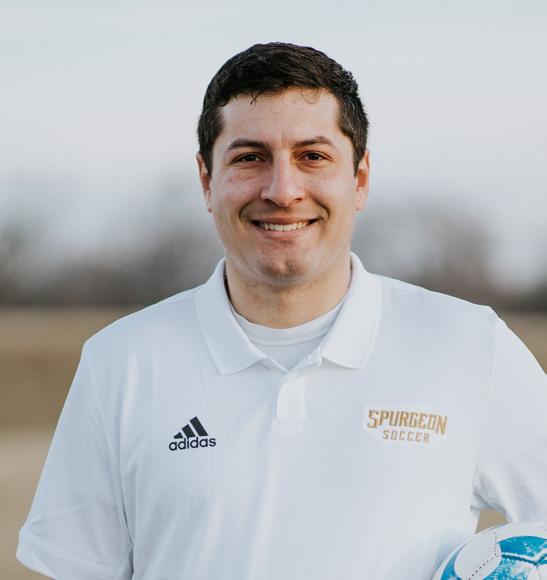
BRINGING THE WHOLE COUNSEL TO BEAR IN BIBLICAL COUNSELING
Midwestern Seminary’s biblical counseling program offers undergraduate (B.A.), graduate (M.A.), and post-graduate (Ph.D. and D.Min.) biblical counseling degrees. These degrees are designed for significant training in the principles and methods of biblical counseling, preparing you for service in a local church, biblical counseling center, or wider ministry setting. Our goal is to equip ministers and laypersons to minister biblically within their local churches and communities, making the church the first place people go for help, rather than a last resort.

Take the next step. mbts.edu/counseling







